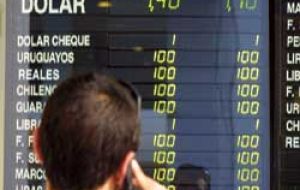MercoPress. South Atlantic News Agency
Argentina's prospects for 2009: flat growth and 20% inflation

The Argentine economy is forecasted to experience in 2009 almost flat growth, inflation above 20%, unemployment closing on two digits and the US dollar in the range of 3.8 to 4 pesos according to the opinion of several economists.
Moreover the situation could worsen if funds continue to abandon Argentina, 2.85 billion in October alone, and an estimated 25 billion in the last twelve months, as a consequence of the erratic policies from the Kirchner couple administration. "The economy is sliding and the tendency is further down, however the only doubt is how fast the fall", according to a former member of the Argentine Economy ministry team, quoted in Buenos Aires La Nacion. The current estimates are distant from a floor of 4% which a cautious Central Bank announced just a few weeks ago. Since then, the Argentine government's decision to take over private pension funds and the global financial crisis have lowered the original estimate to less than 3%, mostly a "pull-on effect" from the strong growth of 2008 and previous years. This means that if in 2009 the Argentine economy expands 3% or 2%, it will be exclusively "statistical inertia" plus zero growth, following a five year period (2003/07) of sustained average annual expansion of 9% and 6% in 2008. Alpha Consultants from Buenos Aires estimate GDP expansion of 2.5%, weak investment and limited credit mostly from government. Economist Rogelio Frigerio is more ambitious: growth between 3.5 and 5%, while another economist Miguel Angel Broda is at the other end: zero or negative expansion. The labour market can expect the percentage of jobless to be at 8% to 10% while the US dollar, all consultants coincide, above 3.80 pesos, as long as deposits don't continue to flee Argentina. In the last twelve months this was equivalent to 10% of the country's GDP. Retail inflation, which government offices admit could reach 14% in 2009, private consultants put it at 18 to 20%. Argentina's current account is estimated to be negative because of the money leaving the country and a more modest trade surplus than this year's 12 billion US dollars, precisely because of the international financial crisis. "There's going to be a significant drop in exports, partly compensated by lesser imports", said Daniel Heymann, from the UN Economic Commission for Latinamerica and the Caribbean. He added that the level of economic activity will be conditioned "by the fleeing capital". And even when the Argentine government could show very robust budget numbers and primary surplus by taking over the private pension funds (equivalent to 5 billion US dollars in 2009 and a stock of 24 billion US dollars) some analysts argue this only confirms the Kirchner couple administration's ever closeness to a default situation. "These recent moves of taking over private funds generate very negative expectations and this are reflected in the country risk, almost in the range of default", argues the former Economy minister Roberto Lavagna who is credited with having pulled Argentina out of the default and collapsed economic situation. Other economists go a step further and anticipate the operation to take over the private pension funds will have a limited impact because "coming maturities next year have to be paid in US dollars and not in Argentine pesos". That is why the Central Bank is so reluctant to use international reserves to pay for Treasury debts, argues economist Jose Del Villar. "The government should repurchase sovereign debt to contain the capital haemorrhage and lower interest rates", he added. Argentina's budget recently approved by Congress estimates growth at 4% in 2009; inflation 8% and the US dollar at 3.19 pesos even when it currently trades at 3.33 pesos. This is also an additional problem for the government because the Kirchner couple strategy traditionally has been to downplay budget indexes so that the surpluses generated, under a special powers emergency act, can be disposed by government simply informing, and not requesting approval from Congress.




Top Comments
Disclaimer & comment rulesCommenting for this story is now closed.
If you have a Facebook account, become a fan and comment on our Facebook Page!